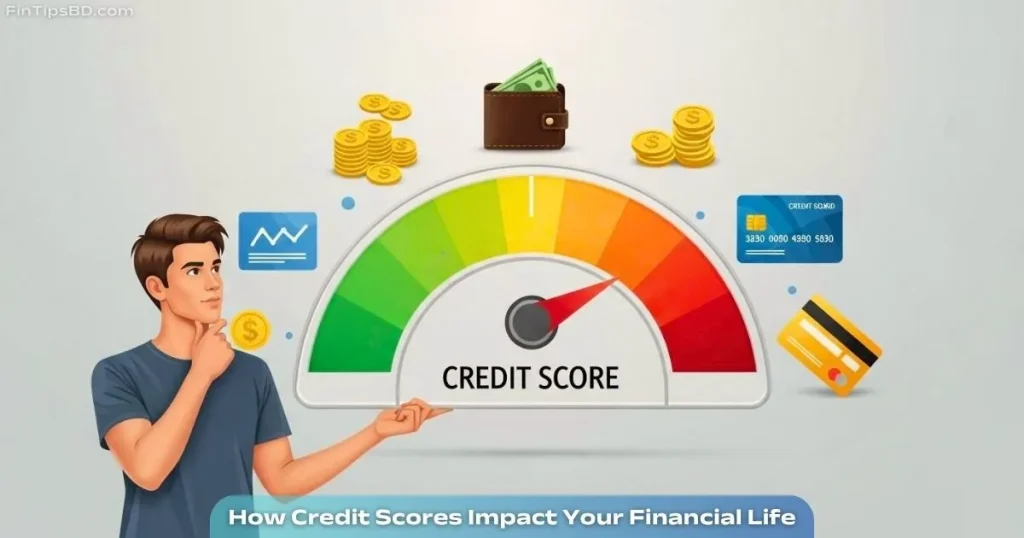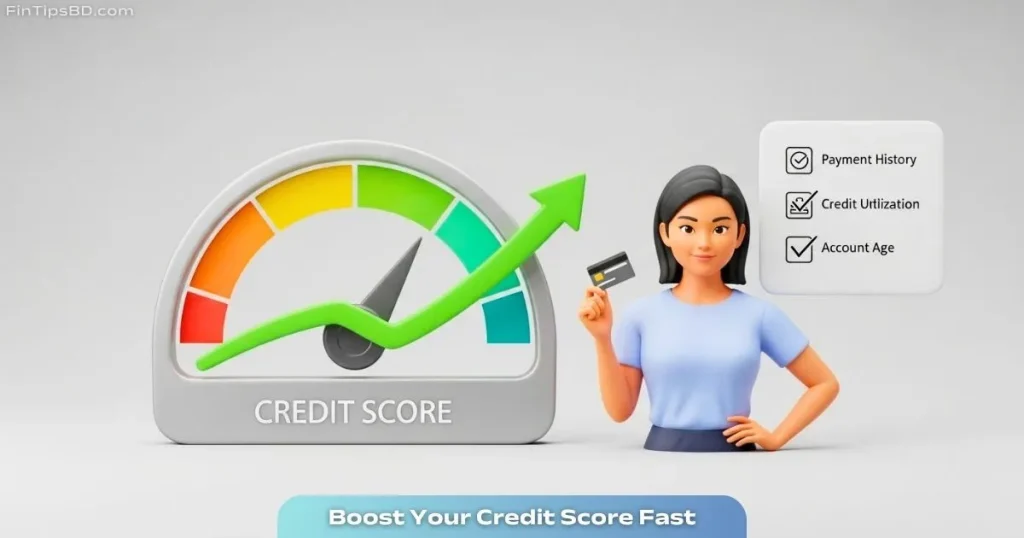What Is A Credit Score? The Shocking Truth That Could Save You Thousands

Most people have heard the phrase “credit score,” but very few realize how much influence this small number has. Whether you’re applying for a credit card, financing a car, or trying to rent an apartment, your credit score can either work in your favor—or hold you back. Truly understanding what is a credit score is could be the key to achieving financial stability or facing unexpected challenges. Here’s something many don’t realize: having a solid credit score could end up saving you thousands of dollars throughout your life.
In this guide, we’ll explain the basics of credit scores—why they matter, how they function, and most importantly, how you can start improving yours today.
Table Of Contents
What Is a Credit Score and Why Does It Matter?
So, what is a credit score exactly? Simply put, it’s a three-digit number that reflects your reliability in paying back borrowed money. It’s calculated using your credit history, including how you’ve managed loans, credit cards, and other forms of debt.
Most credit scores fall between 300 and 850. A higher score means you’re seen as less risky to lenders. The most widely used scoring system is the FICO Score, though another common one is VantageScore.
Here’s a quick look at how the scores are usually ranked:
- 300–579: Poor
- 580–669: Fair
- 670–739: Good
- 740–799: Very Good
- 800–850: Excellent
If your score is on the lower end, lenders might view you as a high-risk borrower, which can lead to higher interest rates—or even being denied a loan. This basic understanding of what is a credit score is the first step toward gaining financial control.
How Credit Scores Impact Your Financial Life

A good credit score doesn’t just help you get approved for loans. It can shape many parts of your everyday life in surprising ways:
- Loan Approvals: Most lenders check your credit score when you apply for things like personal loans, car loans, or mortgages. A strong score can be the deciding factor between getting approved or not.
- Interest Rates: This is where you can either save or lose a lot of money. Higher credit scores often lead to lower interest rates, which means you’ll pay less over time.
- Credit Limits: A better score usually means higher limits on your credit cards, giving you more spending room when you need it.
- Renting a Place: Landlords often check credit scores to decide if a potential tenant is financially responsible. A low score could make it tougher to get approved for a rental.
- Insurance Costs: Believe it or not, some insurance companies check your credit to help figure out how much you should pay for car or home insurance. A good score can help you get lower premiums.
- Job Opportunities: Though it’s not very common, some employers—especially in fields involving money or sensitive data—might review your credit report during the hiring process.
Here’s a real-world example: Suppose you’re applying for a $20,000 car loan. With good credit, you might qualify for a 5% interest rate. Over five years, you’d pay about $2,645 in interest. But if you have poor credit, the interest could jump to 15%, meaning you’d pay over $8,600 in interest alone. That’s almost $6,000 lost, just because of a lower credit score.
What Factors Affect Your Credit Score?
To boost your credit score, you first need to know what influences it. Here are the main parts that make up your score, with their approximate importance:
- Payment History (35%): This is the most important factor. It tracks whether you pay your bills on time. Being consistent with payments shows lenders you’re dependable. Missing payments or paying late—even by a few days—can seriously drop your score and stay on your report for years. This category also includes bankruptcies, foreclosures, and accounts sent to collections.
- Credit Utilization (30%): This shows how much of your available credit you’re using right now. It’s found by dividing your total credit card balances by your total credit limits. A low credit utilization rate (ideally under 30%) looks responsible. For example, if your total credit limit across cards is $10,000, try to keep your total balance below $3,000. Using too much credit may signal to lenders that you’re stretched too thin and risky.
- Length of Credit History (15%): The longer your accounts have been open and in good shape, the better. Lenders prefer to see a long and steady credit history because it gives a clearer picture of how you handle money over time. This factor considers the age of your oldest account, your newest account, and the average age of all your accounts.
- New Credit (10%): Opening many new accounts in a short time can raise red flags for lenders. Every time you apply for credit, a hard inquiry is recorded on your report, which can slightly lower your score for a short time (usually a few points for a few months). One or two inquiries won’t hurt much, but many in a row can mean higher risk.
- Credit Mix (10%): Lenders like to see that you can manage different types of credit well. This includes revolving credit (like credit cards) and installment loans (like mortgages, car loans, or student loans). Having a good mix shows you can handle various financial responsibilities. However, don’t take on debt you don’t need just to improve this factor.
How to Check Your Credit Score for Free
You don’t have to pay to check your credit score. Many banks and credit card companies now offer free credit score monitoring as a benefit for their customers. Just log into your online banking or credit card account to see if this option is available.
You can also get your free credit report—which details your credit history but might not always show your score—from:
- AnnualCreditReport.com: This is the official website authorized by federal law. You’re allowed one free credit report every 12 months from each of the three major credit bureaus: Experian, Equifax, and TransUnion.
- Credit Karma, Credit Sesame, and Experian: These websites offer free score estimates (often using the VantageScore model) and credit report monitoring. While their scores may differ slightly from the FICO score lenders use, they give a good idea of your credit health and let you track changes.
It’s important to know that checking your own credit is safe and won’t harm your score. This is called a “soft inquiry” and has no effect. Only “hard inquiries” from lenders when you apply for new credit can temporarily lower your score.
Steps to Improve Your Credit Score Fast

Now that you understand what is a credit score and its key parts, here are some proven tips to raise your score quickly and responsibly:
- Pay Bills on Time, Every Time: This is the most powerful step you can take. Even a single late payment (30 days or more past due) can stay on your credit report for up to 7 years and hurt your score a lot. Use reminders, calendar alerts, or sign up for autopay to make sure you never miss a due date.
- Lower Your Credit Utilization: Try to pay down your credit card balances to keep your usage below 30% of your available credit. Even better, aim for under 10% if you can. This shows lenders you’re not relying heavily on borrowed money. If you can’t pay off balances, consider asking for a higher credit limit—but avoid using the extra credit.
- Avoid Opening Many New Accounts: Be careful about applying for new credit. Every new credit request causes a hard inquiry, which can lower your score temporarily. Only apply when absolutely necessary, and space out your applications.
- Keep Old Credit Cards Open: Even if you don’t use them often, old accounts add to your credit history length and total available credit—both good for your score. Closing old cards reduces your available credit and can increase your credit utilization, which might hurt your score.
- Dispute Errors on Your Credit Report: Regularly check your credit report for mistakes. Wrong accounts, payments marked late when they were on time, or incorrect balances can all unfairly lower your score. If you find errors, dispute them right away with the credit bureau. They are legally required to investigate and fix mistakes.
Common Credit Score Myths
There are lots of misunderstandings about credit scores that can lead to bad money decisions. Let’s clear up some common myths:
- Myth: Checking your credit score lowers it.
Truth: Only hard inquiries made by lenders when you apply for new credit affect your score. Checking your own score, or when an employer or landlord checks it (with your permission), is a “soft inquiry” and doesn’t affect your score at all. - Myth: You need to carry a balance on your credit card to improve your score.
Truth: That’s false. Paying your full balance every month is actually the best thing for your credit. It helps you avoid interest charges and shows that you handle credit responsibly. Carrying a balance, especially a high one, can hurt your credit utilization rate. - Myth: Closing a credit card will improve your score.
Truth: Actually, the opposite is true. Closing an older card can lower your average credit history length and reduce your total available credit, which may increase your credit utilization ratio. Both effects can hurt your score.
How Long Does It Take to Rebuild Your Credit Score?
Fixing your credit score takes time and steady effort. Depending on how much damage there is—like many late payments, accounts sent to collections, or bankruptcies—it can take from 3 months to a year or more to see big improvements. Still, positive habits like paying on time and lowering debt can start showing results in as little as 30 to 60 days once new information is reported to the credit bureaus.
Conclusion: Don’t Underestimate the Importance of Your Credit Score
Knowing what is a credit score isn’t just about a number—it’s about taking control of your financial future. With a good credit score, you unlock lower interest rates, better money opportunities, and long-term savings that could add up to thousands of dollars. With a poor score, you face higher costs, fewer options, and missed chances.
But here’s the good news: You can change your credit score. By managing your credit carefully, checking your reports often, and fixing any habits that hold you back, you can raise your score and start saving money now. Your credit score reflects your financial health, and by caring for it, you build a stronger base for your entire financial life.
Keywords: what is a credit score, credit score meaning, how credit scores work, improve credit score fast, credit score range, check credit score free, factors affecting credit score, credit utilization explained, payment history importance, credit score myths, credit report errors, credit score impact on loans, credit score and interest rates, rebuild credit score, credit mix and credit score, credit score for renting apartment, credit score and insurance premiums, credit inquiries hard vs soft
